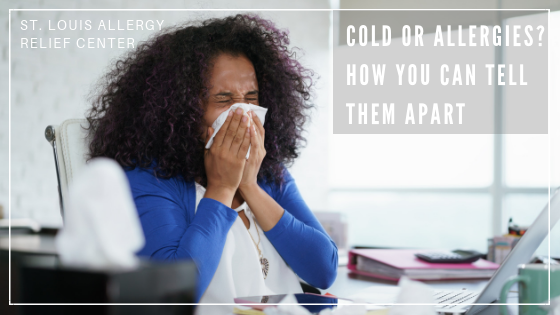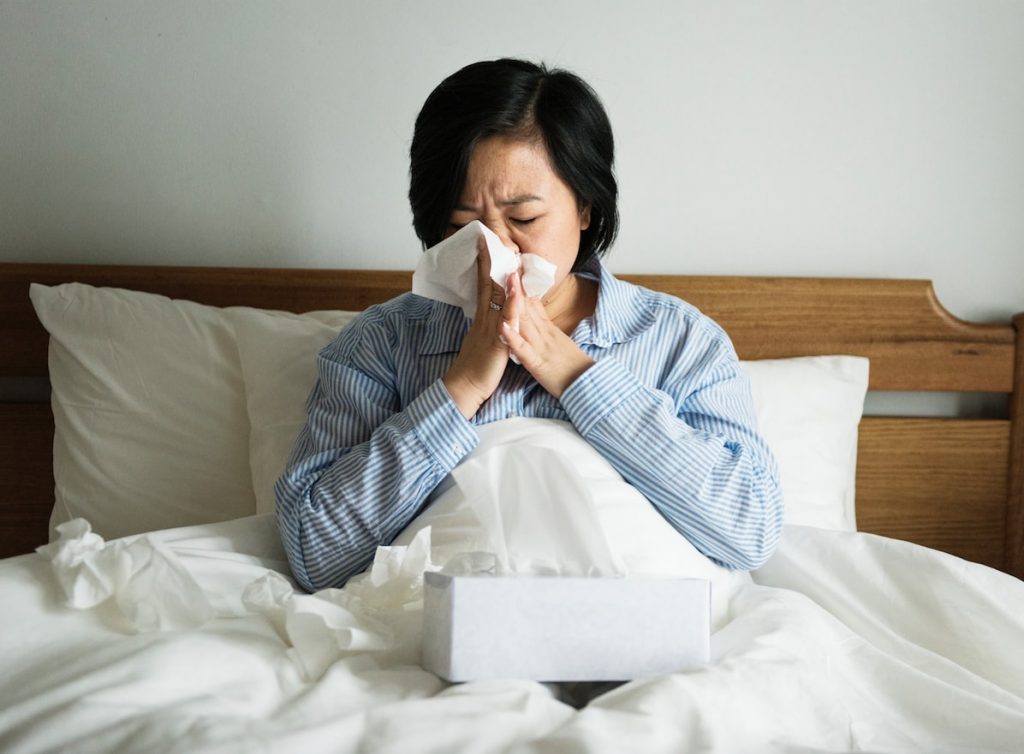Cold or Allergies? How You Can Tell Them Apart

Colds and allergies are one of the most common conditions that affect children as well as adults. But how can you tell which is which? Cold and flu seasons are not far off, so how can you tell what is bothering you? We have made a comparison between colds and allergies and how to tell them apart.
Keep reading to see the differences between colds and allergies.
What are they?
To understand what the differences are between a cold and allergies, we first need to understand their causes. Colds are caused by viruses and there are over 200 viruses that can cause a cold, the rhinovirus being the most common. Although colds occur more commonly in the winter, they can develop any time of the year.
An allergy is not caused by a virus and is not contagious like colds. An allergy occurs because the immune system reacts to a typically harmless substance (allergens) in the atmosphere as if it were dangerous. It is essentially protecting itself from allergens. The body therefore releases compounds to combat allergens, one of these being histamine. Histamine is intended to protect the body and fight an invader, but it is also the cause of many common allergy symptoms.
Manifestations of a Cold
There tends to be some overlap in symptoms when it comes to colds and allergies, like nasal congestion, sneezing and coughing, but a cold has other symptoms to watch out for. With a cold, patients are likely to feel more run down, have bigger headaches, a runny nose, sore throat and, in some severe cases, a low-fever and conjunctivitis or pinkeye. The easiest way to differentiate a cold from an allergy is how the symptoms develop. Symptoms of a cold tend to come gradually over a day or two.

How do Allergies Differ?
Allergies, aside from the common nasal congestion as with a cold, will manifest with itchy, watery eyes, an itchy runny nose and sometimes an itchy throat. This is the easiest way to differentiate between allergies and the common cold: itchiness. An itch is a clear sign of allergies. Some people that suffer from allergies can also develop eczema, a condition where patches of skin become inflamed, itchy, red, cracked, and rough.
If you get “colds” suddenly that always occur at the same time every year, you probably have seasonal allergies, which are very different even though they share some of the same symptoms. Common colds are caused by viruses, while seasonal allergies are the immune systems response to exposure to allergens, such as tree or grass pollen.
| Symptom | Cold | Allergy |
| Cough | Usually | Sometimes |
| General aches and pains | Sometimes | Never |
| Fatigue and weakness | Sometimes | Sometimes |
| Itchy eyes | Rarely | Usually |
| Sneezing | Usually | Usually |
| Sore throat | Usually | Rarely |
| Runny nose | Usually | Usually |
| Stuffy nose | Usually | Usually |
| Fever | Sometimes | Never |
Chart from Mayo Clinic
How to Treat Them
A common cold can be treated with rest, staying hydrated and using a humidifier to reduce congestion. Although there is an abundance of over the counter pain relievers and decongestants, current research indicates that they are not effective in treating coughs and colds. A cold virus must run its course and that is usually 3 to 10 days, although some have been known to last two or three weeks.
Prevention and avoidance are what allergists tend to recommend as a way to treat allergies. Once the allergen the patient is allergic to is identified, an individual is told to avoid them. If the pollen count is high where you are, try to keep the windows of your house and car closed, so you don’t bring pollen inside with you, especially into bed. During peak pollen days, you try to avoid exercising or working outdoors. The problem is that seasonal allergies can last several weeks or months. Avoidance is very difficult, if not impossible.
If you suffer from allergies that cannot be avoided, there are basically two conventional ways to treat. One is to take over-the-counter medications to help block the effects of histamine. The other is immunotherapy, or shots to treat allergies. The theory is that over time, up to several years, the shots will help your body build up a tolerance to the offending allergens.
Unfortunately, conventional treatments do not always work, can have side effects, and in the case of immunotherapy are invasive and painful.
If you have been unsuccessful with treatments or you are looking for something different, St. Louis Allergy Relief Center treats allergies holistically without the use of pain or pills. We are an allergy wellness center, specializing only on natural treatments. We are passionate about helping adults and children achieve their optimum level of health through our all-natural therapies. We specialize in holistic, natural allergy treatments using Advanced Allergy Therapeutics (AAT). AAT treatments are painless and non-invasive, involving no shots or needles, no drugs or herbal supplements, and no avoidance. Our treatments are gentle enough for infants and seniors. We provide you with a detailed treatment plan after completing a comprehensive assessment to determine food and environmental stressors that may be triggering allergies or allergy-like symptoms in you or your children.
We also work with western medical doctors to coordinate treatments if a patient is already under care for allergies, asthma or other sensitivities. Since we are a family practice, we know families and we know kids. Our staff is highly trained, and half our practice is pediatric. We are all parents and grandparents ourselves and know the struggles of having children with allergies. We also deliver community workshops as well as a free monthly informational workshop the first Thursday of every month at 5:45 pm in our Chesterfield office. Our free monthly workshop provides the public with information on our unique approach to allergy treatments and includes an opportunity to meet with our patients for a question and answer session. If you are interested in attending one of our free monthly workshops, please call our office at 314-384-9304 to reserve your space.
So, there you have it, those are the differences between colds and allergies. Make sure you identify the type of condition you suffer from. They are easy to mistake! And make sure to come to St. Louis Allergy Relief Center if you are suffering from allergies. We are the best natural allergy clinic to help you live your life without suffering from allergies and sensitivities. Visit our website https://stlouisallergyrelief.com/ to learn more or call us at 314-384-9304.
Sources
https://www.medicalnewstoday.com/articles/315756.php
https://www.mayoclinic.org/diseases-conditions/common-cold/expert-answers/common-cold/faq-20057857